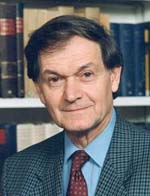
The puzzle of time: The podcast

Roger Penrose talks to us about the nature of time and his cyclic universe model.
This podcast comes to you from a conference on the nature of time. We talk to philosophers of physics Jeremy Butterfield and David Wallace, as well as the eminent Roger Penrose about the puzzle time poses to physicists and what it has to do with the Big Bang and the second law of thermodynamics. The conference is part of the Establishing the philosophy of cosmology project.
There is more about the nature of time in the Plus article What is time?, and you can find out more about Roger Penrose's cyclic universe model, which he talks about in this podcast, in his book Cycles of time.
You can listen to the podcast using the player above, and you can listen and subscribe to our podcast through Apple Podcasts,
Spotify and through most other podcast providers via podbean.
Anonymous
I find it nearly impossible to hear what they're saying. I'd much prefer to read a transcript. Are there at least references or a summary of what they're talking about? What conference was it?
Anonymous
What was that theorem mentioned? I sounded like "Manchacks Theorem", but that does not yield search results. Any help?
Thanks -J
Marianne
Hi! It's Manchak's theorem, named after John Manchak.
Anonymous
The subject of physical reality is so close to my heart, and I hold much admiration for Prof Penrose since I read his book ‘The Emperor’s New Mind’. His book, amongst few others, has inspired me to dig deeper in my thoughts on the subject of physical reality. What I would like to say here is that whilst we - I mean those who try to make sense of physical reality, seem to do so by looking to the world around us for answers, the answers, it seems are mostly within our brains. This concept is by no means new and Prof. Penrose did a great job in covering it in that book.
I would like to add the following: since the diversity we observe in the world reflects the diversity of our senses - our five senses provide us with what we perceived as reflecting different phenomena, yet they are all conveying one reality from different perspectives, like thunder and lightening. In addition, to those senses, we have other senses that we are not directly aware of their whereabouts. They provide us with other perspectives (facets) on physical reality. Time, is one such facet, which we perceive through a hidden sense that monitors the interaction between the structure of our grey matter and the fabric of space. When we consider that interaction analytically (mathematically), it appears as energy that dissipates irreversible though space. There is a great deal more to be said on the subject of time, entropy and irreversibility, for which neither the place nor the time are right. I just wanted to register the above thoughts.
Many thank you for the opportunity – AT.
Anonymous
I have since my early teenage years pondered on my pre conception or actually the pre conception of everyone on this planet, before birth what were we, as there are supposedly a finite number of atoms and energy cannot be destroyed, then we as human beings must have been a part of some other structure animal or vegetable or mineral I just wonder what I must have been, a fence post, a bug, a rock it's just interesting to ponder, thank you jjd